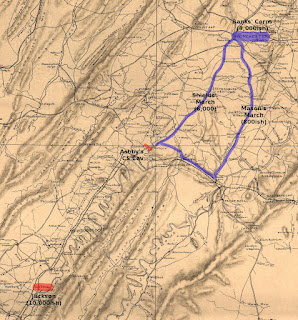—Gen. Ulysses S. Grant, now restored to his command over the Army of the Tennessee, orders all of his divisions to concentrate at Pittsburg Landing on the Tennessee River, just 30 miles from the Confederate base at Corinth, Mississippi.
—Troops from Albert Sidney Johnston’s army begin to arrive at Corinth, Mississippi, where he and Gen. Beauregard are attempting to concentrate the Confederate forces in the area.
---From her plantation at Mulberry, not very far from the South Carolina state capital at Columbia, Mary Boykin Chestnut offers these rather perceptive observations in her diary concerning the Confederate war effort:
Henry Frost says all hands wink at cotton going out. Why not send it out and buy ships ? "Every now and then there is a holocaust of cotton burning," says the magniloquent. Conscription has waked the Rip Van Winkles. The streets of Columbia were never so crowded with men. To fight and to be made to fight are different things.
To my small wits, whenever people were persistent, united, and rose in their might, no general, however great, succeeded in subjugating them. Have we not swamps, forests, rivers, mountains—every natural barrier? The Carthaginians begged for peace because they were a luxurious people and could not endure the hardship of war, though the enemy suffered as sharply as they did! "Factions among themselves" is the rock on which we split. Now for the great soul who is to rise up and lead us. Why tarry his footsteps ?
—The Richmond Daily Dispatch posts a short piece about the excess of idle men in the city, echoing a common anxiety in the Confederacy about the will and patriotism of the people:
Despite the industry of the militia officers for the past two days in hanting up delinquents, there are hundreds of men in the city liable, who are either hiding, or resorting to other means equally as despicable, to escape exposing their precious persons to even remote danger. Independent of the above, the city is just now infested with a large number of persons, with similar ideas of patriotism, who have ignobly left various southern cities to avoid military duty. Some of them set up stores and pretended to be merchants, while many linger around the street corners with dubious and uncertain looks. It may be accepted as a truth, that if able-bodied men are not willing to fight at this particular juncture they are not very good citizens, and their antecedents should be inquired into.
—George Templeton Strong of New York, writes in his journal: "A brief article in the Christian Remembrancer read tonight at the Society Library made me tingle. ‘On the whole, justice is on the side of the rebellion. Slavery has nothing to do with the war. That arose from selfish legislation by Northern majorities on questions of tariff and protection.’ . . . The moral tone of the South is exalted, while the North is base altogether. . . . And so on. So talks the organ of what is best and most hopeful in England. . . ."
—Thirteen mortar schooners under the command of Capt. David D. Porter arrive at Pilottown in the Delta, to join Farragut’s squadron, where he is building up an invasion fleet to capture New Orleans. David Glasgow Farragut—a Southerner who elected to stay with the Union—writes from Ship Island about the Southern cause in disparaging tones in his journal:
None of our vessels have yet arrived. I sent over to Biloxi yesterday, and robbed the post-office of a few papers. They speak volumes of discontent. It is no use—the cord is pulling tighter, and I hope I shall be able to tie it. God alone decides the contest; but we must put our shoulders to the wheel.
I see that Yancey has made a speech in New Orleans, the substance of which was that "all Europe wished to see was, the total destruction of this country." That was the truth, and what a comfort it must have been to him to think that he had been one of the greatest instruments in the consummation of their designs! He has returned home disgusted with England. His whole speech went to show the desperation of "the cause."


No comments:
Post a Comment